Related Research Articles

The Independent Labour Party (ILP) was a British political party of the left, established in 1893 at a conference in Bradford, after local and national dissatisfaction with the Liberals' apparent reluctance to endorse working-class candidates. A sitting independent MP and prominent union organiser, Keir Hardie, became its first chairman.
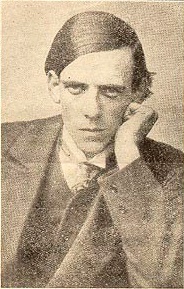
James Maxton was a British left-wing politician, and leader of the Independent Labour Party. He was a pacifist who opposed both world wars. A prominent proponent of Home Rule for Scotland, he is remembered as one of the leading figures of the Red Clydeside era. He broke with Ramsay MacDonald and the second minority Labour government, and became one of its most bitter critics. As the leader of the Independent Labour Party (ILP), he disaffiliated the ILP from the mainstream party in 1932. Afterwards, he became an independent dissident outside front-line politics.
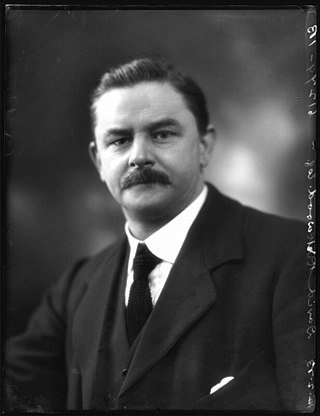
David Kirkwood, 1st Baron Kirkwood, PC, was a Scottish politician, trade unionist and socialist activist from the East End of Glasgow, who served as a Member of Parliament (MP) for nearly 30 years, and was as a leading figure of the Red Clydeside era.

George Buchanan was a Scottish patternmaker, trade union activist and Member of Parliament.
Glasgow Bridgeton was a parliamentary constituency in the city of Glasgow. From 1885 to 1974, it returned one Member of Parliament (MP) to the House of Commons of the Parliament of the United Kingdom, elected by the first-past-the-post voting system.

The 1948 Glasgow Camlachie by-election was held on Wednesday 28 January 1948, following the death of the sitting Member of Parliament, Campbell Stephen.
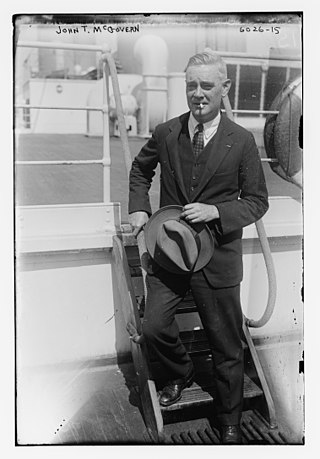
John McGovern was a Scottish socialist politician.
Richard Collingham Wallhead, known as R. C. Wallhead, was a British Member of Parliament.
Annie Drummond Maxton was a Scottish socialist politician and trade unionist.
The 1946 Glasgow Bridgeton by-election was held on 29 August 1946, following the death of Independent Labour Party (ILP) Member of Parliament for Glasgow Bridgeton, James Maxton.
The 1945 Newport by-election was a parliamentary by-election held on 17 May 1945 for the British House of Commons constituency of Newport in Monmouthshire. It was the last by-election of the 1935–1945 Parliament.

The 1934 Merthyr by-election was a parliamentary by-election held on 5 June 1934 for the British House of Commons constituency of Merthyr in Wales.
The 1940 East Renfrewshire by-election was a parliamentary by-election held on 9 May 1940 for the British House of Commons constituency of East Renfrewshire in Scotland.
The 1941 Edinburgh by-election was a parliamentary by-election held on 11 December 1941 for the British House of Commons constituency of Edinburgh Central in Scotland.
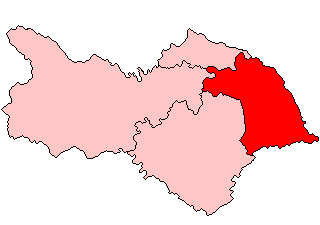
The Scarborough and Whitby by-election was a parliamentary by-election for the British House of Commons constituency of Scarborough and Whitby on 6 May 1931.
The 1941 Lancaster by-election was a parliamentary by-election for the British House of Commons constituency of Lancaster, Lancashire on 15 October 1941.
The Popular Front in the United Kingdom attempted an alliance between political parties and individuals of the left and centre-left in the late 1930s to come together to challenge the appeasement policies of the National Government led by Neville Chamberlain.
The Scottish Socialist Party (SSP) was an organisation of former Independent Labour Party members who wished to remain part of the Labour Party after their former party disaffiliated.
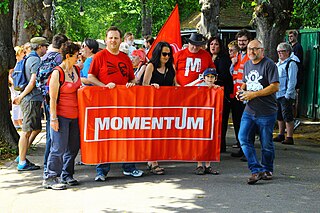
In British politics, the Labour left is the more left-wing faction of the Labour Party. Alongside the Labour right, it is one of the two main wings of the Labour Party. It is also one of its four main factions alongside the soft left, the old Labour right, and the New Labour right. In the British parliament, it is represented by the Socialist Campaign Group of Labour members of Parliament (MPs).
References
- ↑ Andrew Thorpe, "The British General Election, 1931", Oxford University Press, 1991, p. 17-18.
- ↑ Andrew Thorpe, "The British General Election, 1931", Oxford University Press, 1991, p. 152-153.
- ↑ A list of the "non-endorsed candidates", drawn up by the National Agent G.R. Shepherd, was included in the minutes of the National Executive Committee in October 1931. This list had 22 names on it: it did not include John Abbott (Stockport), John McGovern (Glasgow Shettleston) or Charles O'Donnell (Glasgow Hillhead).
- ↑ F. W. S. Craig, "British Parliamentary Election Results 1918-1949" 3rd ed., Parliamentary Research Services, Chichester, 1983.
- ↑ McGovern's selection in the 1930 by-election had been achieved through dubious means and had been condemned by the Labour Party conference which declared he was unfit to be a Labour Party candidate. See Thorpe, p. 182-3.
- ↑ The Times House of Commons 1931. London: The Times Office. 1931. p. 51.
- ↑ F. W. S. Craig, "British Electoral Facts", Parliamentary Research Services, Chichester, 1989, p. 31.
[[